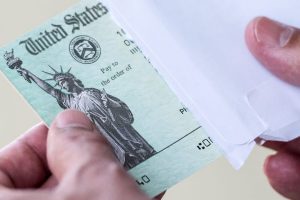The IRS has begun issuing automatic refunds to some Americans for the $10,200 unemployment tax break

- The latest relief bill allows an exclusion of $10,200 of unemployment benefits from income tax.
- Some people may have qualified for the tax break but filed their return before the law passed.
- The IRS is currently reviewing tax returns in phases and issuing refunds where necessary.
- Visit Personal Finance Insider for more stories.
The Internal Revenue Service announced Friday that it will begin issuing automatic refunds this week to some people who collected unemployment in 2020 but missed a valuable tax break.
“The IRS identified over 10 million taxpayers who filed their tax returns prior to the American Rescue Plan of 2021 becoming law in March and is reviewing those tax returns to determine the correct taxable amount of unemployment compensation and tax. This could result in a refund, a reduced balance due or no change to tax (no refund due nor amount owed),” the IRS said.
A $1.9 trillion economic relief package included a new tax exclusion on the first $10,200 of unemployment benefits collected in 2020. (The relief doesn’t apply to benefits you’re getting in 2021.) That unemployment tax break doubles for married couples who file taxes jointly. All filers need to have modified adjusted gross income below $150,000 to qualify.
Popular Articles
The tax break was a welcome relief — but it cropped up in the middle of tax season. Millions of people who had already filed and reported unemployment compensation were left wondering whether they’d missed out on the exclusion. The IRS announced on March 31 that it would indeed review submitted tax returns in phases to ensure taxpayers receive the tax break if they qualify.
When can I expect my refund?
Refunds deemed necessary will be issued in two phases, starting in May and continuing throughout the summer. Most payments will be automatically direct deposited. Taxpayers who did not include bank information on their tax return will get paper checks.
The IRS is first recalculating the exclusion for single taxpayers, who are eligible to exclude up to $10,200 of benefits collected in 2020, then move on to married taxpayers who file jointly and are eligible for an exclusion of up to $20,400 and to others with complex returns.
IRS Commissioner Charles Rettig had previously urged taxpayers who qualify for the exclusion not to file an amended return to claim it. Rettig told the House Ways and Means Committee on March 18 that he expected to be able to issue automatic refunds.
However, the IRS said on March 31 that some filers would need to submit amended returns if the unemployment tax exclusion adjusted their income to a level that would qualify them for additional tax deductions or credits, such as the earned-income tax credit.
Disclosure: This post is brought to you by the Personal Finance Insider team. We occasionally highlight financial products and services that can help you make smarter decisions with your money. We do not give investment advice or encourage you to adopt a certain investment strategy. What you decide to do with your money is up to you. If you take action based on one of our recommendations, we get a small share of the revenue from our commerce partners. This does not influence whether we feature a financial product or service. We operate independently from our advertising sales team.
Source: Read Full Article
